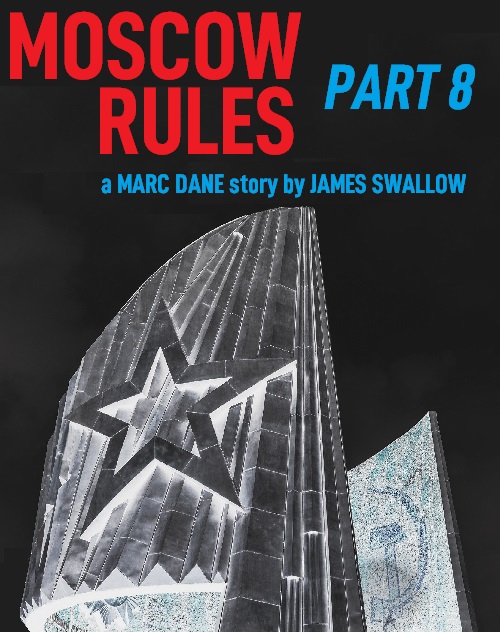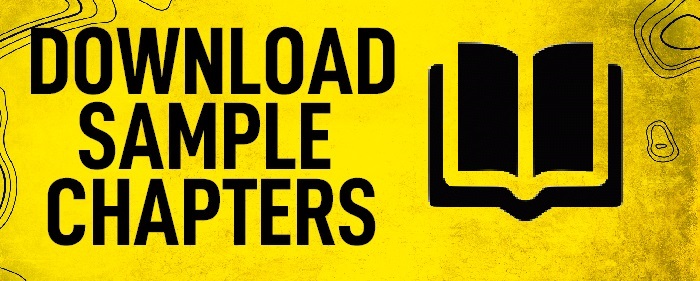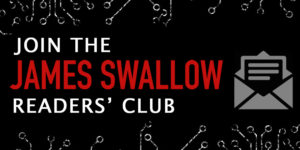The latest chapter of MOSCOW RULES is here…

On a mission to fulfil a request for his employer on the streets of Moscow, Marc Dane finds himself dragged into a deadly scavenger hunt for a prize that could cause chaos in the wrong hands…
In Part 7, Marc was caught in a trap laid by the FSB, and learned that the Russian security services will stop at nothing to get the missing file – and when a firefight ensues, he races to escape the crossfire…
Read on for Part 8 of MOSCOW RULES; future chapters will be released via this blog, but if you’d like to get early access, sign up to the James Swallow Reader’s Club at this link or type your email address in the box at the bottom of this page.
MOSCOW RULES part 8 – DO NOT HARASS THE OPPOSITION
The first train to Monino left Yaroslavsky Station just before sunrise, so after Marc convinced a half-asleep teller to sell him a ticket, he hid out for the rest of the night in a dingy corner of the rail terminus’s upper tier, doing his best to avoid the attention of any roving Moscow cops.
He was too wired to sleep, for fear he’d nod off only to be shaken awake again by the mercenary thugs from Aleph, or worse, find himself on the wrong end of an FSB intervention. Instead, he did his best to disappear into the city’s invisible night population of homeless people, petty criminals and lost drunks. Every raised voice that he heard, every footstep that passed too close made him tense – but it was this or chance something more dangerous, and risking being caught along the way.
Time oozed by at a glacial pace, but after what seemed like an eternity, his departure crawled on to the boards and Marc found his way down to the snow-clogged platforms. He boarded a near-empty carriage at the front of the elektrichka, a Warsaw Pact-era electric commuter train that hissed and rattled its way out of Moscow and into the pre-dawn. It was damp and cold in there, but at least he could pull down his FC Spartak cap and gratefully snatch some much-needed rest without interruption. He set a timer on his spyPhone to buzz him an hour or so later, and went out like a light. He didn’t dream – his mind went into a dark, silent nothingness.
Marc reached the outskirts of the suburb as he gasped awake like a man coming up from drowning. For a moment, he couldn’t remember where he was, but then the brief panic quickly ebbed and he blinked at the buildings passing by outside.

Cupped in a bend of the river Klyazma, just another sprawl of blocky conurbation clustered on the outskirts of the Russian capital, the garrison town of Monino was known for two things; the first was VVA-Podmoskovye, a famous Rugby Union team with a string of championship title wins, but the second was the reason Marc was on his way there. Monino was home to the Central Air Force Museum, on the grounds of the Gagarin Academy, where the future officer corps of Russia’s VKS aerospace force were trained. He’d forgotten completely about the existence of the place until one of Gurik’s agents had mentioned it back at the café.
The museum? She’d said the words after the FSB agent saw the name of the town embossed on the tin toy plane Sergei Morozov left as a clue. It was one more hoop for Marc to jump through in the search for the dead man’s so-called ‘ledger’, the prize that everyone seemed desperate to get their hands on at any cost.
It was a race to the finish line now. Marc knew as much as the Russians did, and his only hope of getting to the ledger first would be if the conflict he’d sown between the other two interested parties – the FSB intelligence agency and the Aleph mercenary contractors – was enough to force them on to the back foot. The Monino clue wouldn’t take a lot of decoding, but only if Gurik or the mercs took it at face value. There was a tendency in the espionage world to overthink things, even when the simplest explanation was usually the most obvious one.
However it plays out, Marc reflected, I’ve pissed off everybody at this point. He gave a wry smile at that. No change from normal, then.
The outbound platform was deserted as Marc disembarked at Monino, but the other one leading in to Moscow was busy with workers on their way into the city, everyone in heavy coats, gloves and hats to fight off the cold from the grey snow. Marc felt the chill, so he kept moving to stave it off, cap down tight, hood cinched in, hands in his belly pocket under his stolen raincoat. As he marched over the icy streets in the direction of the museum, he felt his phone buzzing again.
He put the ear-bead back in. “Yeah?”
“Still in the game?” Lucy Keyes’s voice warmed him a little.
“Still,” Marc confirmed. “Close run thing.” He gave her a precis of his experience at the café, finding the secret safe-boxes, and the next piece of Morozov’s posthumous puzzle.
“Didn’t I tell you not to poke the bear?” She sucked her teeth. “You’re not supposed to annoy the locals out there, it never ends well. You do understand I am trying to make sure you don’t get buried under a snowbank somewhere, right?”
“The situation on the ground was fluid,” Marc replied. “I had to improvise.”
“Same old, same old,” Lucy noted. “One day you’re gonna run out of luck, Marc.”
“I don’t doubt it.” Marc had this fanciful idea that luck was like a bank account – you started off with a set amount, and every dumb or risky thing you did was taking a withdrawal, gradually clocking it down toward zero. But you could never know how much was in that account, or how much a given risk might cost. So when the tally went into debt, as it inevitably would, well… That’d be the end of you. “Hopefully, not today, though.”
“This is your last chance to get out,” she said, after a long pause. “The Russkies and those merc assholes, they’ll be distracted. You can slip away, if you go now.”
“You reckon?”
“I called in a couple of markers. Rubicon still has a few people who owe us favours inside Russia. I can have a cargo plane fuelled and ready to get you across the border, but we gotta pull the trigger soon or it won’t happen.”
He slowed to a halt, considering it. “If we let Morozov’s ledger get loose when we know we have a chance to grab it, then we’re ignoring the whole reason for Rubicon’s existence.” He shook his head. “Small actions with large consequences, that’s what we do. We’ve got a chance here to take something dangerous off the board before it can be used to do evil. I mean, think about it… Imagine the uses a high-level KGB kompromat file could be put to, if it was in the hands of somebody with no moral compass.”
“I know that,” she said. “But are you willing to get killed over it?”
“I’m here, aren’t I?”
Lucy snorted dryly. “You know, most people become less reckless as they mature.” She paused again, then pressed on. “Let me ask you this, if you’re not gonna step away. Have you considered that Sergei Morozov is playing you? Playing everyone? You read his file… He like to run people like puppets on a string. Why wouldn’t he want to make his enemies run through the maze one last time after he died, even if he wasn’t around to see it?”
Her point was undeniable; Morozov would have known how things would play out after his unanticipated death. He could easily have set up some mechanism to destroy his deadly legacy in the event of his untimely end – but instead he had left the pieces of a scavenger hunt in place, knowing full well that whomever came in his wake would end up fighting over the book that had kept him safe during his career.
The old spy wanted all of this to happen. He wanted men chasing each other through the streets of Moscow. He wanted blood spilled for it.
“Do we even know what’s in Morozov’s ledger,” said Lucy, “I mean, actually know for sure? Has anyone ever seen the thing?”
The same question had been rolling around Marc’s thoughts all night. He remembered the expressions on the faces of Melor Rykov and his thuggish subordinate Gurik – both had shown genuine pause at the notion of Morozov’s secret blackmail file, which suggested they had something to fear from it. That kind of dread only came from a guilty conscience, so clearly they didn’t doubt the suggestion that Morozov had dirt on them. In the dark world, everyone had blood on their hands, everyone had their own secrets to keep. This wasn’t a career where a person could stay clean, only one where they might hope to hide the worst of themselves from the world.
“Rykov and Gurik believe in it,” Marc went on, as he started walking again. “If they do, then so does the FSB and the Russian government. And whomever is paying Aleph’s high price to send their men after it, they believe it too. People want that ledger, and they’re willing to kill for it. So like it or not…” He frowned.
“You’ll only know if it’s worth the hassle when you have the thing.”
“Exactly.” He shook his head. “Sergei, you were a crafty sod.”
“I’ll keep working on an exit plan,” continued Lucy. “On the outside chance you actually get your hands on the ledger, you’ll need to get the hell out of there real quick.”
“Copy that,” Marc agreed. “Push the details to my phone when you’re ready.”
“Good luck-” She started to sign off, but he had one final question for her.
“The contractors, Aleph,” he said. “Did Kara find out who is employing them?”
“Weird thing,” Lucy noted. “Kara tracked deployment patterns from a bunch of Aleph assets, all inside Russia, all over the last week. But there’s been no shift in Aleph’s cash reserves… No incoming payments from any new clients for new operations. It doesn’t track.”
She left him chewing on that as she cut the call, and Marc continued on, approaching the main gates of the Central Air Force Museum through the light but steady snowfall.
“Mercenaries don’t work for free,” Marc said aloud, the words escaping his mouth in a pop of vapour. “It’s in the job description.” With the FSB agents, the motivation for going after Morozov’s ledger was clear-cut – but Aleph’s soldiers were wholly transactional. The fact that he couldn’t guess at the hidden hand directing them bothered Marc more than he was willing to admit.
He put that thought aside, slowing as he came toward the gate, catching the sound of raised voices. Parked directly in front of the entrance was the slab-sided shape of a motor-coach, the windows misted with condensation, the passengers inside pressing up to the glass to observe the source of the angry conversation unfolding. He soon realized that the coach was full of kids – pre-teens, so it appeared, who couldn’t keep still, making noise and moving around as they tried to get the best vantage point. A class trip? That seemed the most likely explanation.
Then Marc heard the distinctive sound of what could only have been a backhand slap and his attention snapped to the man and the woman standing near the front of the coach, confronting a pair of armed guards blocking the gate. The man – middle-aged, with the look of a history teacher about him – staggered back a step, holding his face where the blow had landed, and in the same instant the kids on the bus all fell silent.
Marc moved closer, taking care to conceal himself among the trees lining the roadway. He got a better look at the guards – they were both sporting Bizon submachine guns on straps over their shoulders, but their uniforms were not Air Force, meaning they weren’t from the nearby military academy.
One of the guards snarled at the teacher’s female companion, threatening to give her a dose of the same treatment if she didn’t do as he said. Marc struggled to follow the words, but he got the gist of it.
A sob catching in her throat, the woman tried to explain to the angry guard they had permission to be here, they were a party from a school in Minsk that had travelled overnight to visit the museum. The armed man advanced toward her, his comrade following him, pointing his Bizon in the woman’s direction. He thundered a final warning that Marc had no trouble translating.
“The museum is closed, by military order! Take these noisy brats and get lost, or you will be arrested!”
Clutching his nose, trying to stem the stream of blood flowing freely from it, the male teacher stepped in to usher his counterpart away, back on to the coach under the wide-eyed stares of their pupils.
Seizing the opportunity, Marc moved while the guards still had their attention on the bus, slipping unseen from his cover and around the empty gatehouse. A barrier lay across the drive leading up to the museum proper, so he took a different path, finding a service road that snaked toward the main buildings.
As much as the cold made him want to keep it, Marc shrugged off the purloined raincoat so he could move faster, and jogged along the treeline. Careful to stay low, he crested a shallow rise, painfully aware that it would only take one observant guard to spot him and raise the alarm.
He’d hoped that the museum would have its usual population of tourists and visitors, but that faded quickly as he got his first look at Monino’s snow-patterned layout. Dozens of Soviet-era aircraft lay out before him, arranged in lines around a central quadrangle. It was a field of white snow and old steel the colour of tarnished silver, dotted here and there by stars and identity numbers rendered in blood-crimson. Missile-shaped fuselages large and small faced toward one another, many of them with canted or delta-formed wings. Some were narrow-waisted fighter-craft, archetypical MiGs of all generations from Korean War jets to Cold War interceptors, others huge multi-engine long-range bombers built to carry apocalyptic nuclear payloads. There were roosts of helicopters across the way, gunships laden with cannons, heavy cargo birds and small scouts, with their rotor blades drooping toward the earth under the weight of thick ice.
Before this life, before Rubicon, Marc had been a military aviator for the Royal Navy, and part of his training had drummed into him the NATO codenames and capabilities of many of these aircraft. It was strange to see so many of them here, silent predators gathered as if they were waiting to shake off the frost and take to the skies again.
From his vantage, Marc could spot pairs of figures moving around the pathways surrounding the static aircraft. They had flashlights, some swinging them up to pan along under the spans of huge wings, searching.
And Marc knew exactly what they were looking for. He waited for his moment, and then slid down a shallow incline, lurching toward the cover of a massive, rusting transport plane and the sharp-angled Su-27 fighter jet that stood beside it.
Catching his breath, he heard the thudding of rotor blades cutting through the low cloud above and looked up. A sleek shape sliced through the cold air, a glossy black shark that wheeled and turned before nosing away toward a landing on the far side of the field. It wasn’t a military craft from the nearby academy, but a high-end civilian helicopter of the kind used by private corporations – and as it swept low, Marc glimpsed figures inside in dark jackets, readying their weapons.


